Google's Top 20 SEO Ranking Factors That Will Matter in 2025
Oct 28, 2024
Written by Casey Bjorkdahl

Casey Bjorkdahl is one of the pioneering thought leaders in the SEO community. In 2010, Casey co-founded Vazoola after working for a Digital Marketing Agency for five years in New York City. Vazoola is now one of the fastest growing and most widely recognized SEO marketing firms in the country.
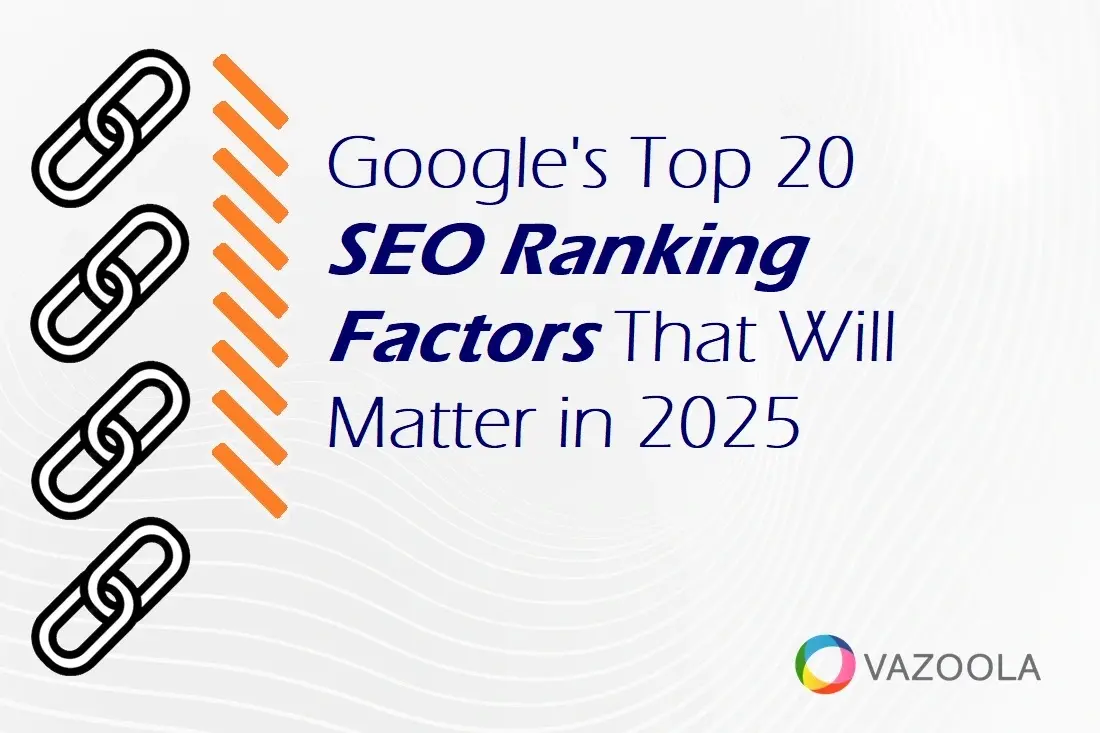
What makes one site rank in the Google search results pages and another one doesn't?
How many Google ranking factors are there, anyway? In other words, how many search ranking factors does Google have?
An array of Google search ranking factors determines how the search giant ranks a website. Once you understand them, it will make all the difference in your optimization efforts.
Sounds easy enough, right?
Unfortunately, SEO just isn't that simple.
Google remains elusive about its exact ranking algorithm. But that hasn't stopped experts from trying! They identify patterns and trends through testing, data analysis, and experience.
To compile our list of the top SEO ranking factors, we looked at a variety of sources–-including our own in-house experts and other popular lists.
Our list covers the most powerful ranking factors, including content quality, backlinks, and even mobile-friendliness. As we said, we can’t be sure of everything, but these are our best educated guesses.
We should point out a recent Google leak. An article from The Verge shed light on leaked documents detailing parts of Google's ranking system. While it revealed some new pieces of information that no one knew, much of it just reaffirmed what we’ve been doing all along, including many SEO strategies professionals already use.
Does Google really have 200 ranking factors, as some of our peers have suggested? We hope this post helps you understand the most important SEO ranking factors..
With that in mind, let's dive into the most critical Google SEO factors that can make or break your site's performance in search.
SEO Ranking Factors: Key Takeaways for 2025
-
The quality and relevance of the content make all the difference in the SEO performance. Useful content that actually satisfies user intent will rank higher in search engine results provided by Google.
-
Technical elements such as site speed, mobile-friendliness, and technical SEO audits help materially in the way search engines crawl, index, and rank a website.
-
Building backlinks from reputable and authoritative websites helps establish trust and improves search rankings, but link quality is more important than quantity.
-
Google will reward websites that give users a seamless experience: The site opens quickly, navigates well, and is responsive to mobile.
-
Keep your content fresh and relevant on a regular basis, and avoid thin or spammy pages, which may have a positive result in ranking.
Table of Contents
7 Most Important Google Ranking Factors for SEO
Of all the Google top ranking factors, these are the most influential 7 elements that will have a positive (or negative) impact on the way content appears in search results.
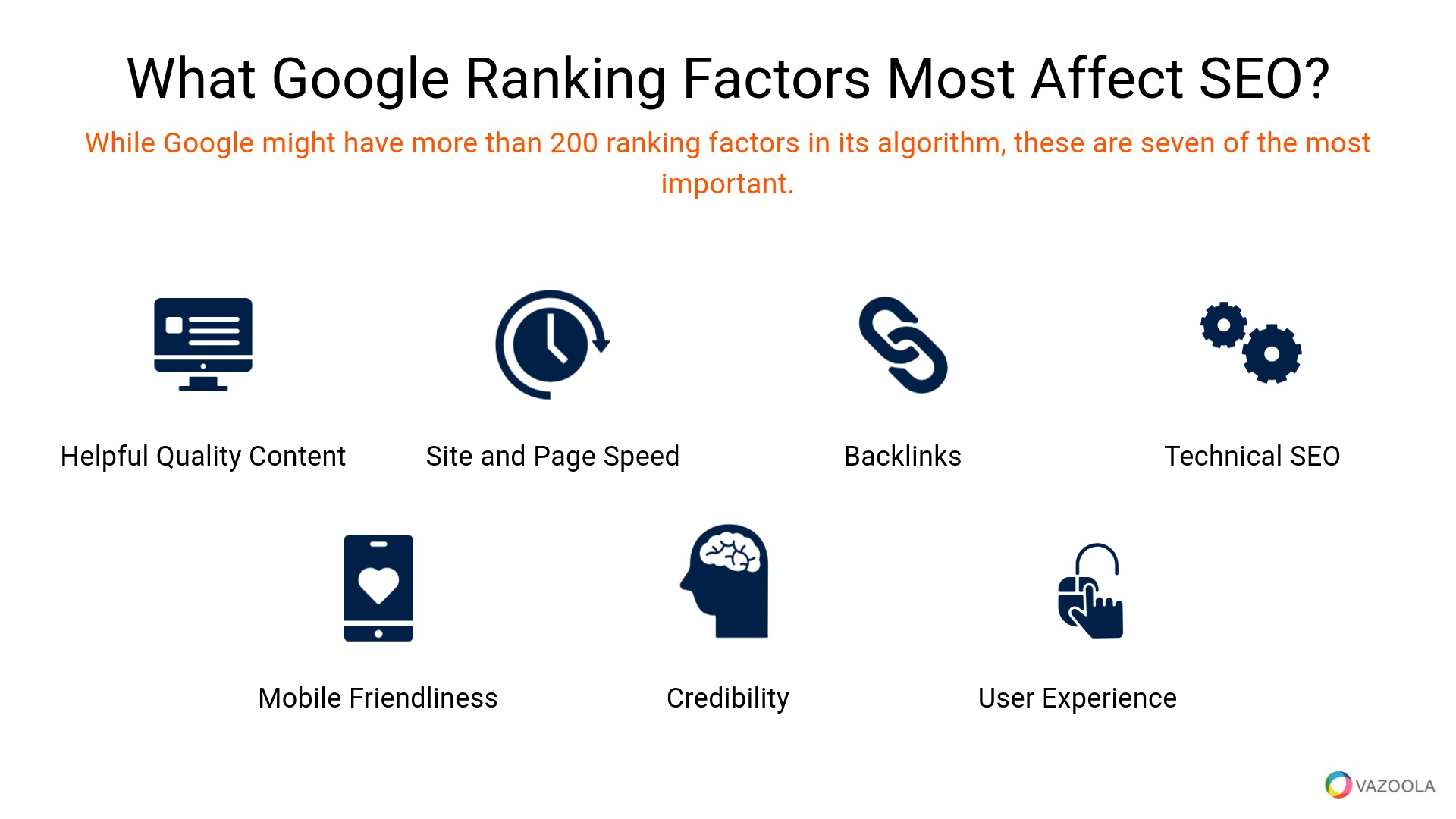
Helpful Content, Content Quality
Google helpful content core updates place an emphasis on informative, relevant content. Content that meets user intent and answers questions is most likely to perform well. Quality, helpful content enhances SEO performance because it caters to audience needs.
Check out our guide on How to Create Content That Google Loves.
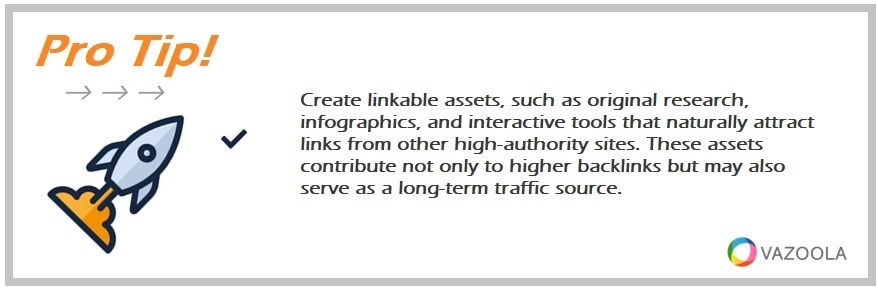
Create linkable assets, such as original research, infographics, and interactive tools that naturally attract links from other high-authority sites. These assets contribute not only to higher backlinks but may also serve as a long-term traffic source.
Site and Page Speed
Website and page speed impacts not only user experience but also search rankings. Google loves fast websites since they reduce bounce rates, so they keep users on their sites. Slow websites will be ranked adversely since they tend to frustrate users.
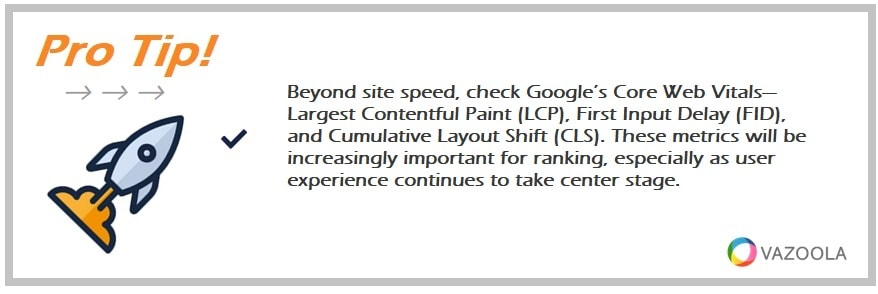
Beyond site speed, check Google’s Core Web Vitals—Largest Contentful Paint (LCP), First Input Delay (FID), and Cumulative Layout Shift (CLS). These metrics will be increasingly important for ranking, especially as user experience continues to take center stage.
Backlinks
Backlinks serve as signals of credibility and trustworthiness. Quality backlinks from authoritative sites tell Google your content is valuable. However, the linking site’s relevance and authority are important for ranking improvements.
Learn all about how to boost your Google rank with backlinks from our Link Building Guide.
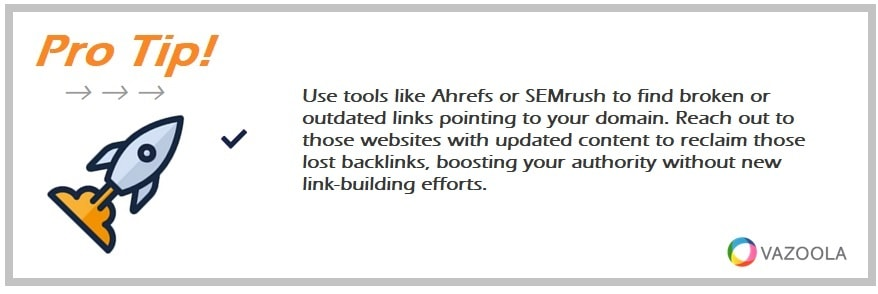
Use tools like Ahrefs or SEMrush to find broken or outdated links pointing to your domain. Reach out to those websites with updated content to reclaim those lost backlinks, boosting your authority without new link-building efforts.
Technical SEO
Technical SEO covers factors such as site architecture, crawling, indexing, and structured data. These elements help search engines understand and properly index your site, making it easier for your content to appear in search results. Conduct a technical SEO audit to make sure your website is performing at its best.
Mobile Friendliness
With the rise of mobile searches, Google favors websites that are mobile-friendly. Sites optimized for mobile devices, including a responsive design and easy navigation, generally rank higher than those with poor mobile performance.
Credibility
Credibility is often established through backlinks, domain authority, and brand reputation. The factor plays a vital role in SEO. A credible website is seen as trustworthy by both users and search engines, which positively influences search rankings.
User Experience
An overall seamless user experience (UX), which includes easy navigation, fast loading times, and mobile responsiveness, can boost search rankings. Google rewards websites that prioritize user satisfaction by improving their visibility in search results.
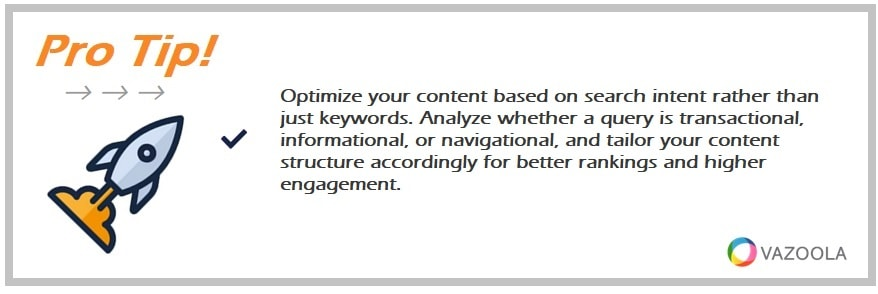
Optimize your content based on search intent rather than just keywords. Analyze whether a query is transactional, informational, or navigational, and tailor your content structure accordingly for better rankings and higher engagement.
Other Google SEO Ranking Factors
While the above seven Google page ranking factors are important, it’s by no means an exhaustive list. That’s why we’ve expanded our list with 13 more key ranking factors. Implement these strategies for better SEO results.
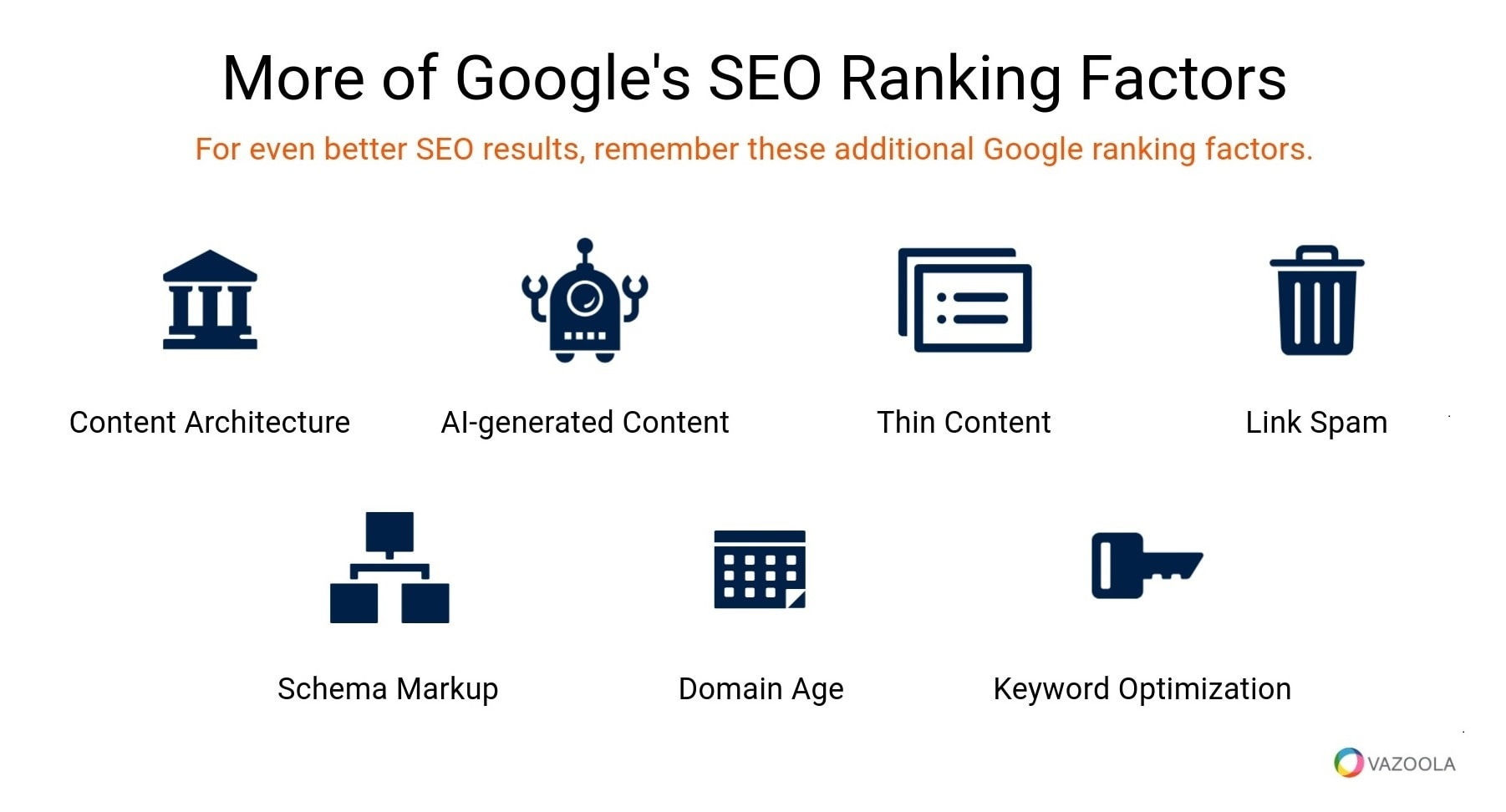
Content Architecture
Content architecture refers to the structure of your website and how the pages interlink with one another. Well-structured architecture ensures users and search engines can navigate the site efficiently, hence giving the site better crawlability and high ranking in the SERPs. A clear hierarchy guarantees internal linking directs attention to the important pages.
Read about how to maximize your content architecture and other on-page SEO factors, check out our resource page.
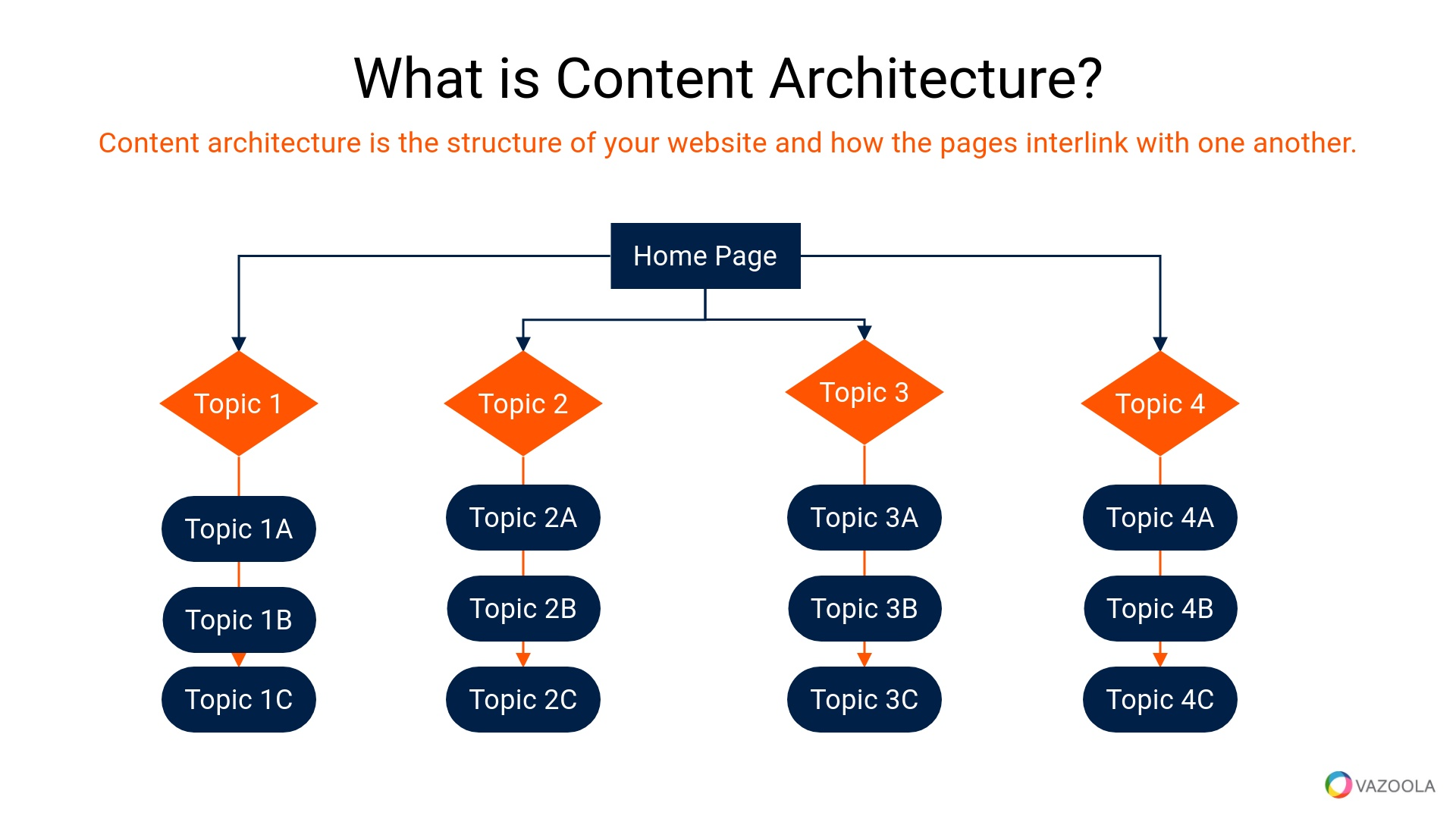
AI-generated Content
AI-created content can help build linkable assets efficiently, but it needs to be reviewed for quality. Google may penalize thin pages that aren't unique, lack depth, or appear mass-produced. AI content must therefore be helpful, relevant, and aligned with user intent so that your rankings stay in good shape.
Thin Content
Thin content adds very little value for users and contains shallow information – or at best unoriginal. Pages with thin content rarely rank high because they do not meet the quality ranking factors that Google prescribes. Webmasters and SEOs should therefore focus on comprehensive, well-researched information that will enhance the chances of ranking.
Link Spam
Link spam refers to irrelevant link building or excessive links created with the intent to manipulate rankings. This goes against Google’s guidelines. Therefore, such sites could incur penalties that drop their rankings. Quality over quantity is key for building backlinks and maintaining SEO health.
Schema Markup
Schema markup is the structured data added in the code of a website. It helps search engines better understand the context of the content. Implementing schema can improve how your content is displayed in search results, potentially leading to enhanced visibility, like rich snippets.

Go beyond basic schema to incorporate rich media, reviews, event listings, and FAQs that make your content appear higher in search engine result pages through rich snippets, knowledge graphs, and even voice search.
Domain Age
Older domains have a general level of trust and authority that help in ranking. However, domain age cannot solely guarantee better ranking. Publishing better content with a proper SEO strategy is more important.
Keyword Optimization
Proper keyword optimization will help ensure your content is appropriate for users’ search queries. This includes strategic placement of primary and related keywords in titles, headers, and body text to enhance relevance without overstuffing the content.
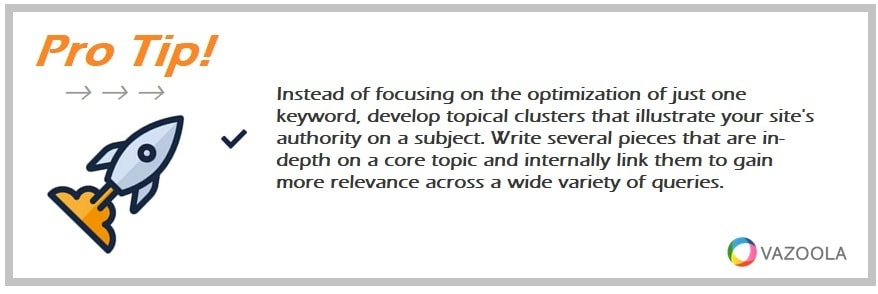
Instead of focusing on the optimization of just one keyword, develop topical clusters that illustrate your site's authority on a subject. Write several pieces that are in-depth on a core topic and internally link them to gain more relevance across a wide variety of queries.
Title Tags and Meta Descriptions
Title tags and meta descriptions are short summaries that tell both users and search engines what a given page is about. Keyword-rich, optimized, and persuasive tags and descriptions have an indirect impact on rankings when the optimization leads to increased click-through rates.
Images
Optimized images enhance user experience by making content visually appealing. They also help with SEO. Proper alt text, image file names, and image compression can improve loading speed and ensure extra value for search rankings.
Anchor Text
Anchor text – the actual text linked in a hyperlink – provides context to users and to search engines for the page that the link is directing to. Relevant, keyword-rich anchor text can help with SEO, while over-optimization or irrelevant anchor text can be detrimental.
Google Local Search Ranking Factors
Google local ranking factors are influenced by factors like Google My Business listings, online reviews, location-based keywords, and even Google Map ranking factors. If your business targets local audiences, optimizing these elements boosts visibility in local search results.
Social Signals
Social signals are the likes, shares, and comments that come from various social media platforms. These do in fact have an indirect impact on SEO, although they aren’t a direct ranking signal. However, the more substantial the social presence, the greater the traffic and engagement, which sends signals of relevance to search engines.
Read all about these and other off-page SEO factors in our article about off-page SEO.
Freshness
Freshness refers to how much time has passed since the content of your page was updated or published. In some queries, Google's algorithm prefers newer, up-to-date content. Frequent refreshes of your content and timely updates are important if you want to rank high in search engines.
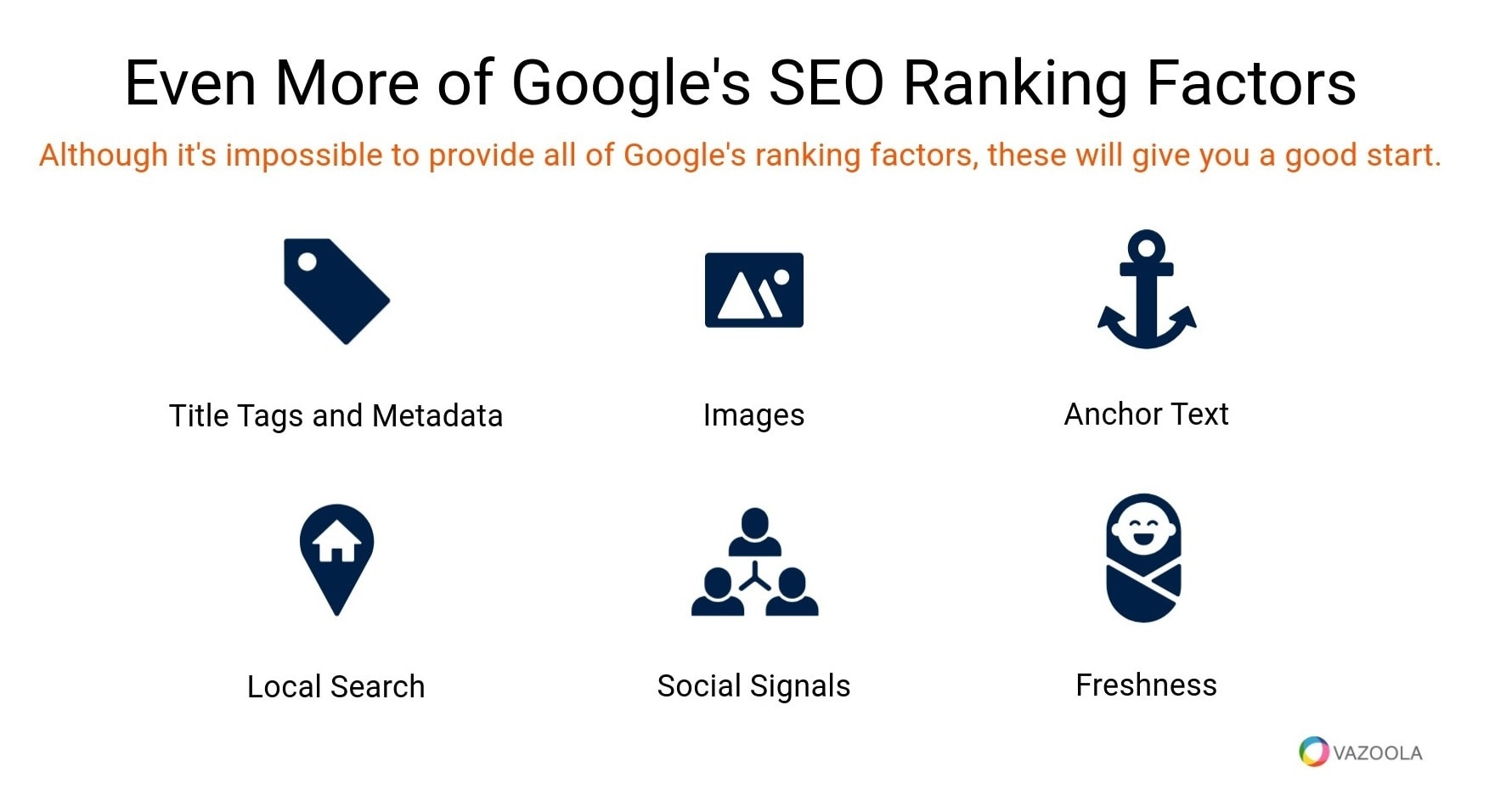
Understand Google’s Ranking Factors for SEO
Optimizing for Google’s search rankings requires attention to many factors. These range from content quality and backlinks to technical SEO and user experience.
While it’s true that Google keeps its exact ranking algorithm secret, the expert-identified factors on our list provide a strong foundation for improving your website visibility.
SEO is not just about appearing at the very top of SERPs. It's also about creating something that really deserves to rank high. It meets the needs of users and gives them an ideal user experience. That means you’ve satisfied SERP ranking factors.
When you focus on the most influential ranking factors SEO, you boost your site's performance and stay ahead of competition.
Ready to take your SEO strategy to the next level? Fill out our form to schedule a demo with Vazoola. We’ll show you exactly how we can help you better optimize your website to rank.

